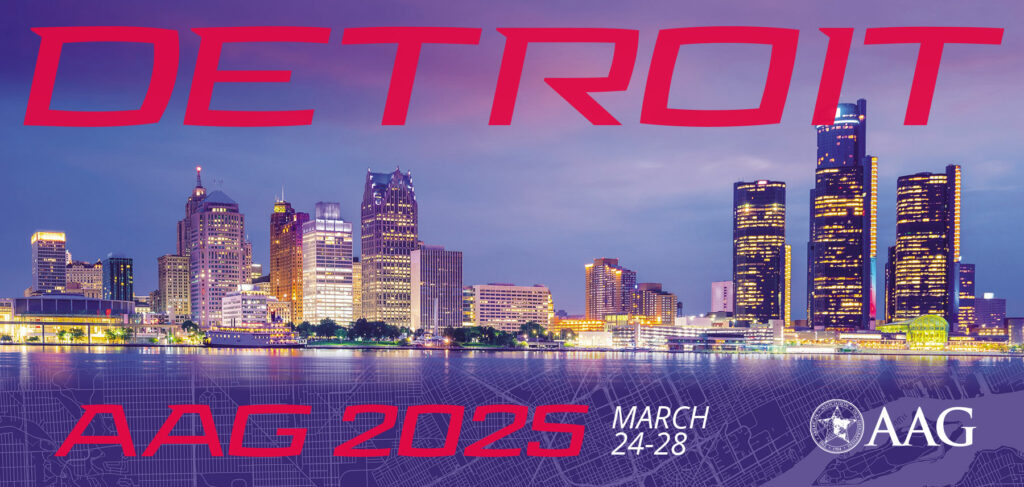
CFP: 2025 AAG Symposium on GeoAI and Deep Learning for Geospatial Research
2025 AAG Annual Meeting, Detroit, MI, March 24-28, 2025
Lead Organizers:
Song Gao, University of Wisconsin, Madison
Wenwen Li, Arizona State University
Yingjie Hu, University at Buffalo
Budhu Bhaduri, Oak Ridge National Laboratory
Orhun Aydin, Saint Louis University
Shawn Newsam, University of California, Merced
Samantha T. Arundel, United States Geological Survey
Gengchen Mai, University of Texas Austin
Krzysztof Janowicz, University of Vienna
The field of GeoAI is advancing at an astonishing speed. We are excited to witness the significant growth of GeoAI in terms of its methods, its diverse geospatial applications, and its increasing societal impacts. For example, GeoAI has been applied to advance our understanding of environmental and climate change on the earth, improve individual and population health, enhance community resilience in natural disasters, strengthen smart and connected communities, more accurately predict spatiotemporal traffic flows, support humanitarian mapping and policymaking, and more. From the perspective of methodological development, we have observed a paradigm shift from using task-specific models with supervised learning to leveraging the power of visual foundation models, large language models (LLMs), and multimodal foundation models to achieve zero-shot to few-shot geospatial learning. We have also seen an increasing body of pioneering research integrating spatial theories and principles into general AI model design to develop “spatialized” AI that best tackles spatial and spatiotemporal problems.
Building on the success of previous AAG GeoAI symposiums and continuing to push the cutting edge of GeoAI research and its societal impact, the 2025 symposium aims to bring together geographers, GI scientists, remote sensing scientists, computer scientists, health researchers, urban planners, transportation professionals, disaster response experts, ecologists, earth system scientists, stakeholders, and many others to share recent research outcomes and discuss challenges for GeoAI research in the following years.
Sessions (all sessions will be accessed at: https://bit.ly/aag2025geoai):
- GeoAI and Deep Learning Symposium: Representing Geographic Locations in AI Models (Panel discussion session; In-person session; Contact: Yingjie Hu, yhu42@buffalo.edu, University at Buffalo; Panelists: Gengchen Mai, University of Texas at Austin; Morteza Karimzadeh, University of Colorado Boulder; Yiqun Xie, University of Maryland College Park, Ziqi Li, Florida State University)
- GeoAI and Deep Learning Symposium: Generative AI in GIScience: a research agenda towards autonomous GIS (Panel discussion session; In-person session; Contact: Zhenlong Li,zhenlong@psu.edu, Penn State University)
- GeoAI and Deep Learning Symposium: GeoAI for Sustainability & Resilience I: Research Advances (Panel discussion session; in-person session; The organizing team)
- GeoAI and Deep Learning Symposium: GeoAI for Sustainability & Resilience II:: From Research to Real-World Applications (Panel discussion session; in-person session; The organizing team)
- GeoAI and Deep Learning Symposium: Current Developments and Concerns in GeoAI and CartoAI (Panel discussion session; In-person session; Contact: Aileen Buckley, Esri (abuckley@esri.com); Sam Arundel, sarundel@usgs.gov, U.S. Geological Survey)
- GeoAI and Deep Learning Symposium: GeoAI for Feature Detection and Recognition (Paper session; In-person session; Contact: Sam Arundel, sarundel@usgs.gov, U.S. Geological Survey; Co-organizers: Wenwen Li, Arizona State University; Kevin McKeehan, HNTB, and Ernie Liu, U.S. Geological Survey )
- GeoAI and Deep Learning Symposium: Spatially Explicit Machine Learning and Artificial Intelligence (Paper session; In-person session; Contact: Gengchen Mai, gengchen.mai@austin.utexas.edu, University of Texas at Austin; Co-organizers:Yao-Yi Chiang, University of Minnesota-Twin Cities; Zhangyu Wang, University of California Santa Barbara; Di Zhu, University of Minnesota-Twin Cities; Yiqun Xie, University of Maryland; Hao Yang, University of Georgia)
- GeoAI and Deep Learning Symposium: GeoAI for Spatial Analytics and Modeling (Paper session; In-person session; Contact: Di Zhu, dizhu@umn.edu, University of Minnesota; Co-organizers: Guofeng Cao, University of Colorado, Boulder; Song Gao, University of Wisconsin, Madison; Peng Luo, Massachusetts Institute of Technology)
- GeoAI and Deep Learning Symposium: UrbanAI for Sustainable, Climate-Resilient Environments (Paper session; In-person session; Contact: Steffen Knoblauch, steffen.knoblauch@uni-heidelberg.de, Heidelberg University; Co-organizers: Hao Li, Technical University Munich; Peng Luo, Massachusetts Institute of Technology; Filip Biljecki, National University of Singapore; Alexander Zipf, Heidelberg University)
- GeoAI and Deep Learning Symposium: GeoAI and Urban Mobility Analytics (Paper session; In-person session; Contact: Dan Qiang, dan.qiang@mail.mcgill.ca, McGill University; Co-organizers: Grant McKenzie, McGill University, Xiao Huang, Emory University; Yihong Yuan, Texas State University)
- GeoAI and Deep Learning Symposium: GeoAI for Disaster Resilience (Paper session; In-person session; Contact: Bing Zhou, bbz5159@psu.edu, Penn State University. Co-organizers: Zhenqi (Ryan) Zhou, University at Buffalo; Lei Zou, Texas A&M University; Yingjie Hu, University at Buffalo; Qunying Huang, University of Wisconsin-Madison; Marcela Suárez, Penn State University, Yi Qiang, University of South Florida; Manzhu Yu, Penn State University; Morteza Karimzadeh, University of Colorado Boulder)
- GeoAI and Deep Learning Symposium: GeoAI for Human Geography (Paper session; In-person session; Contact: Xiao Huang, Emory University, xiao.huang2@emory.edu; Co-organizers: Siqin Wang, University of Southern California; Peter Kedron, University of California, Santa Barbara; John Wilson, University of Southern California)
- GeoAI and Deep Learning Symposium: Human-Centered Geospatial Data Science (Paper session; Hybrid session; Contact: Jiaxin Feng, Jiaxin.Feng@dartmouth.edu, Dartmouth College; Co-organizers: Hoeyun Kwon, Lehman College – The City University of New York; Yuhao Kang, UT Austin)
- GeoAI and Deep Learning Symposium: Social Sensing and GeoAI for Public Health (Paper session; In-person session; Contact: Binbin Lin, bb2020@tamu.edu, Texas A&MUniversity; Co-organizers: Lei Zou, Texas A&M; Yi Qiang, University of South Florida; Xiao Huang, Emory University)
- GeoAI and Deep Learning Symposium: Generative AI – Opportunities and Challenges for GIScience Research (Paper session; in-person session; Contact: Junghwan Kim, Virginia Tech, junghwankim@vt.edu Co-organizer: Kee Moon Jang, MIT; Jinhyung Lee, Western University; Yuhao Kang, UT Austin)
- GeoAI and Deep Learning Symposium: Spatial Data Science and GeoAI Ethics: Bridging Research and Education (Paper session; Hybrid session; Contact: Yue Lin, liny2@uchicago.edu, University of Chicago; Co-organizers: Hongyu Zhang, University of Massachusetts Amherst; Bing Zhou, Penn State University)
- GeoAI and Deep Learning Symposium: GeoAI for Cartography (Paper session; Contact: Xiran Zhou, China University of Mining and Technology, xrzhou@cumt.edu.cn), Wenwen Li, Arizona State University)
To present your research in one of these sessions, please register and submit your abstract at https://aag.secure-platform.com/aag2025/. When you receive confirmation of your submission, please forward your confirmation email to the session organizers by November 14, 2024.